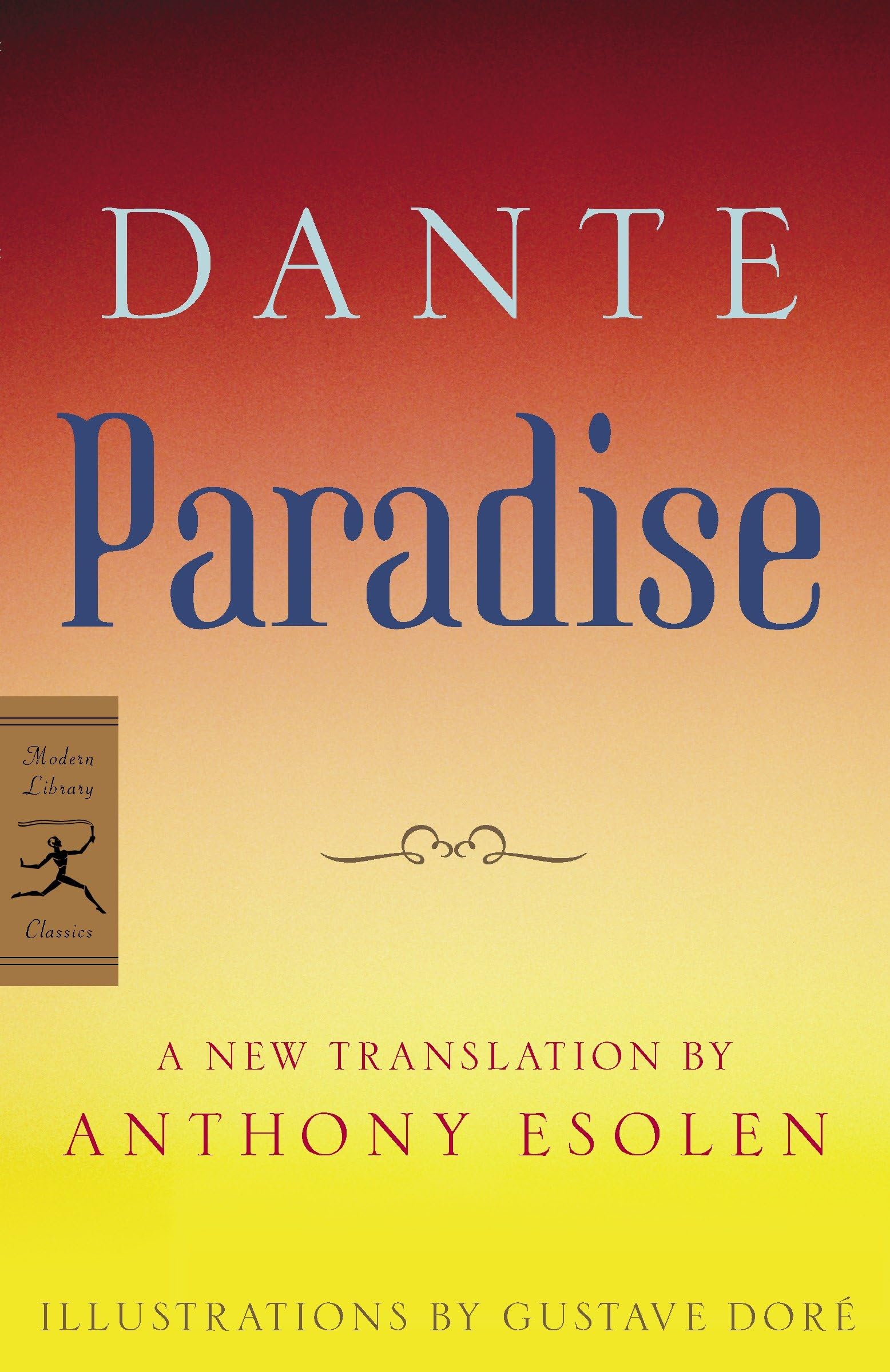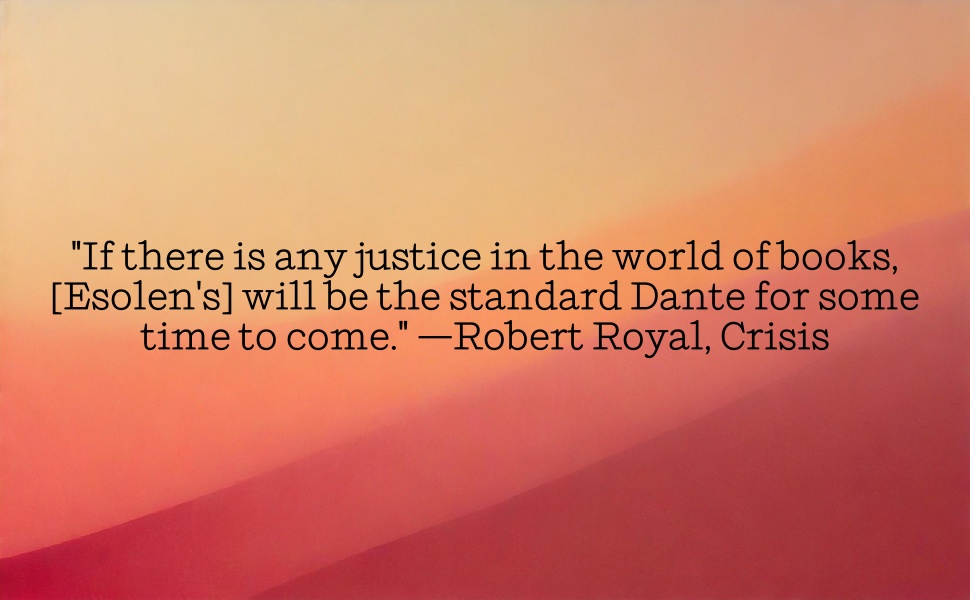Customer Services
Copyright © 2025 Desertcart Holdings Limited


Paradise (The Divine Comedy) [Dante, Dore, Gustave, Esolen, Anthony] on desertcart.com. *FREE* shipping on qualifying offers. Paradise (The Divine Comedy) Review: Translations in both English and Italian. - Great side-by-side comparisons of the Italian and English translations. The footnotes help clear up any confusion and the illustrations are very good. Probably for the more advanced reader. Review: An excellent translation of Dante's Divine Comedy - This translation by Anthony Esolen reads smoothly and has very helpful footnotes. I switched to this translation after trying to read through Wordsworth's for the 100 Days of Dante reading challenge. With an extensive appendix to give context and quotes from Dante's sources, this translation helped me understand what I was reading without a background in Italian history and medieval politics.

| ASIN | 0812977262 |
| Best Sellers Rank | #80,710 in Books ( See Top 100 in Books ) #25 in Italian Poetry (Books) #85 in Ancient & Classical Poetry #125 in Epic Poetry (Books) |
| Customer Reviews | 4.8 4.8 out of 5 stars (215) |
| Dimensions | 5.21 x 1.19 x 8.01 inches |
| Edition | Reprint |
| ISBN-10 | 9780812977264 |
| ISBN-13 | 978-0812977264 |
| Item Weight | 13.2 ounces |
| Language | English |
| Part of series | The Divine Comedy |
| Print length | 544 pages |
| Publication date | February 13, 2007 |
| Publisher | Modern Library |
| Reading age | 1 year and up |
J**.
Translations in both English and Italian.
Great side-by-side comparisons of the Italian and English translations. The footnotes help clear up any confusion and the illustrations are very good. Probably for the more advanced reader.
E**.
An excellent translation of Dante's Divine Comedy
This translation by Anthony Esolen reads smoothly and has very helpful footnotes. I switched to this translation after trying to read through Wordsworth's for the 100 Days of Dante reading challenge. With an extensive appendix to give context and quotes from Dante's sources, this translation helped me understand what I was reading without a background in Italian history and medieval politics.
D**N
Excellent
This is as good as Esolen's other translations of the Divine Comedy, which is to say quite good. Italian on one page, Esolen's English facing.
S**Y
Highly Recommended!
A friend and I read the whole of Dr. Esolen's beautiful translation of Dante's Divine Comedy (I am copying this review to the other two canticles) over a few months, along with the DVD lecture series on it that Dr. Esolen has made, which is available through different vendors. I HIGHLY recommend the project to anyone, particularly Catholics, because while the footnotes and endnotes are outstanding, the lecture series really brings it home to our lives and spirituality. We did this exercise because Bishop Barron had commented how fruitful the Divine Comedy was for his spiritual life and ministry. Having a lecture series and set of matching translations by a consummate scholar and faithful Catholic, who translated Dante's great Catholic opus into a work that can be appreciated by today's students, is a precious pearl beyond price, and I am so grateful I was able to have and use it. (The OCD in me wishes that the books had coordinated covers, but I don't judge a book by its cover!)
E**R
It’s the translator!!!
I have purchased the paperback, the hardcover, and the Kindle version of this book. Long story I cannot commend Anthony Esolen’s translation highly enough. He brings to the translation such a wonderful understanding of Dante’s poetry. His introduction to this work is INVALUABLE. Even if the translation was not as good as it is, I’d still get it for the introduction.
P**T
3rd book of Divine Comedy by Dante
Arrived on time, in good shape. I am using this with the Inferno and Purgatorio for an online class. I read and studied these long ago but today I am finding deeper meaning and interest. Wanted the entire works. This has the Italian alongside on the left page and that is interesting and helps remind me of my Italian....haven't gotten to this yet though as the class has just started and runs through Lent.
J**.
Describing the Indescribable
In Paradise, Dante's taken on an impossible task: describing the indescribable. Even St. Paul found it impossible to recount his mystical experience of heaven. The Inferno and Purgatory read like journeys onto which theological and philosophical points are appended. Paradise reads more like a theological treatise onto which a journey is appended. Dante's vision of Paradise is deeply poetic, thoughtful, theological, and thought-provoking. Dante's description of the fall of the angels (and Esolen's notes thereon) are particularly insightful. Dante (the poet not the character in the poem) spends much effort on what constitutes a just ruler and on the relationship between Church and state. Never does he discuss the joy in heaven over the repentant sinner. Nor does he present the saints he meets as active intercessors for those on earth, though in canto xviii Dante the character does ask the heavenly army to pray for those led astray by a corrupt pope, and later (xxxii) he asks Beatrice to pray for him. In the final canto St. Bernard intercedes for Dante, begging the intercession of the Blessed Virgin that Dante may behold the beatific vision. But all those folks on earth who beg the saints to pray for them? I didn't notice any saint responding to the entreaties of those on earth, or indeed, even acknowledging that he heard their prayers. I did not find Dore's illustrations of much value in my appreciation of Paradise, unlike with the Inferno and Purgatory. I thought the final cantos of Paradise were the volume's strongest. Esolen's Introduction and his notes are very good aids. I've read (and reviewed on Amazon) Esolen's translations of the three books of the Divine Comedy. He's to be complimented on these highly readable and reasonably priced books.
S**D
Fabulous introduction and notes
The introduction to this book is comprehensive and thoughtful. Anthony Esolen writes beautifully and does a great job of explaining the framework of Dante's Paradise. The notes are extremely helpful, too, though I think I would have preferred footnotes to end notes, as I had to keep flipping to the back. It was a minor distraction, however, and I never would have begun to appreciate Dante's poetry without Esolen's notes. If anybody is interested in more, the author is preparing a series of instructional CD's for the entire Divine Comedy. As of this writing , only the CD's on the Inferno are available, but I'm eagerly awaiting the rest of the series because I think Esolen has a great way of explaining things.
M**F
classical
Trustpilot
1 month ago
2 weeks ago